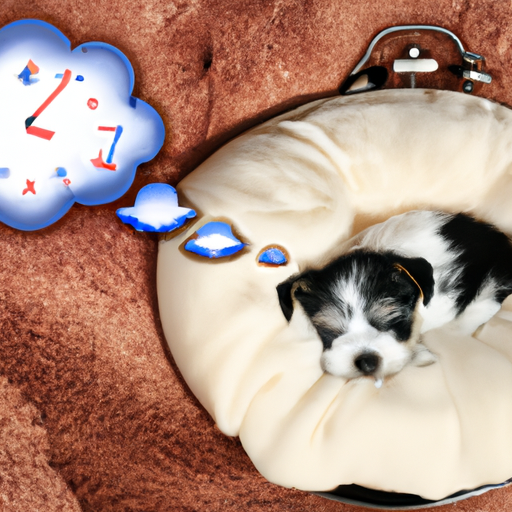As a new pet parent, it’s crucial to understand the sleeping habits of your 8-week old pup. Understanding these sleeping patterns will not only help you create a nurturing environment for your new friend but also give you a sense of peace in knowing that their behavior is normal.
What is the Typical Sleep Pattern of an 8-Week-Old Puppy?
Your little bundle of joy will spend about 18 to 20 hours of the day sleeping. This might seem excessive, but remember, your puppy is just a baby and needs plenty of rest for healthy development. Here’s a basic outline of a puppy’s daily schedule:
- Morning: Wake up and go outside for a potty break.
- Morning to Afternoon: Playtime interspersed with naps.
- Afternoon to Evening: More nap time, playtime, and mealtime.
- Night: Sleep time (with necessary potty breaks).
Why is Sleep So Important for Puppies?
Sleep is essential for your puppy’s physical and mental development. Here are some reasons why:
- Growth: Sleep promotes growth. Puppy growth hormones are primarily released during sleep.
- Learning: Sleep helps consolidate memory, helping your puppy learn and remember new skills.
- Rest: Sleep allows your puppy to rest and recharge, ensuring they have the energy for play and exploration.
Factors Affecting Puppy’s Sleep
Several factors can influence how much your puppy sleeps:
- Age: Younger puppies tend to sleep more. As they grow older, their sleep time gradually decreases.
- Activity Level: Active puppies may sleep more from exhaustion.
- Health: Illness can either increase sleep (due to fatigue) or decrease it (due to discomfort).
How to Create a Comfortable Sleeping Environment
Creating a comfortable sleeping environment can help your puppy sleep better. Here are some tips:
- Bedding: Provide a comfortable dog bed or blanket.
- Quiet: Ensure the sleeping area is quiet and free from distractions.
- Darkness: Puppies sleep better in the dark. Consider using blackout curtains or a dog crate cover.
- Temperature: Keep the room at a comfortable temperature – not too hot, not too cold.
How to Establish a Sleep Routine
Establishing a sleep routine can help your puppy understand when it’s time to sleep. Here’s how:
- Consistency: Stick to a consistent schedule for meals, playtime, and sleep.
- Bedtime Ritual: Create a bedtime ritual, such as a final potty break and a calm cuddle session.
- Crate Training: Introduce a crate as a safe, cozy space for sleep.
What to Do if Your Puppy Doesn’t Sleep?
If your puppy doesn’t sleep, it may be due to several reasons:
- Separation Anxiety: Puppies might have trouble sleeping alone.
- Excess Energy: High-energy puppies may need more playtime to tire out.
- Medical Issues: If your puppy persistently struggles with sleep, consult a vet.
FAQ
Q: Should I wake my puppy up to go potty?
A: Yes, at this age, puppies have small bladders and may need to go potty every 2-3 hours, even during the night.
Q: My puppy is sleeping more than 20 hours a day. Should I be concerned?
A: While puppies do sleep a lot, excessive sleep could indicate illness. If your puppy is also lethargic while awake, it’s best to consult a vet.
Q: Can I sleep with my puppy in my bed?
A: While it’s a personal choice, it’s generally recommended to crate train your puppy and have them sleep in their own space.
Understanding your puppy’s sleep habits is integral to their health and well-being. By knowing what to expect, you can provide the best care possible for your new furry friend. Happy puppy parenting!



